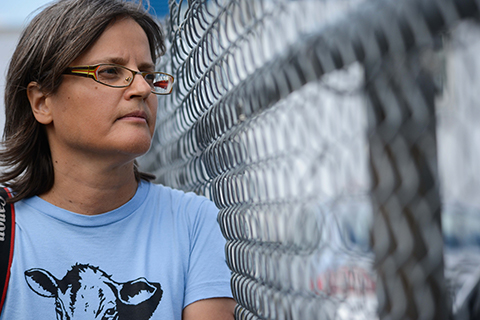Anita Krajnc was in fourth year when she went to a campus screening of The Animals Film, a groundbreaking British documentary about the exploitation of animals in modern society. “I walked out of the basement of the old Sigmund Samuel Library where it was shown and became a vegetarian and animal rights activist,” she says. About a decade later, she saw The Witness, another movie about animal cruelty. That was the day she went vegan.
Today, Krajnc (BA 1990 UC, MA 1993, PhD 2001) is known worldwide as the woman who was put on trial – and ultimately acquitted this May – for giving water to a thirsty pig en route to an abattoir in Burlington, Ontario. Her case garnered support from animal rights groups across the globe, including personal backing from the president of PETA (People for the Ethical Treatment of Animals), and more than 300,000 strangers who signed online petitions.
Long before the media storm, though, Krajnc (pronounced kreinz) had been quietly and steadfastly leading a small grassroots movement against animal agriculture – a term she says captures all exploitation of animals, and includes both factory farms and smaller farms. She founded Toronto Pig Save in 2010 after seeing pigs in transport trucks on their way to a now defunct slaughterhouse in her downtown Toronto neighbourhood.
“Seeing those pigs changed everything for me,” she says. “It was a very different experience from watching animals suffer on screen. It was indescribably profound, and for me led to an epiphany. I realized that when you bear witness, when you actually get close to the animals, it become a top-of-mind issue for you to rectify the injustice.”
Since the summer of 2011, Toronto Pig Save has held three “vigils” – one for pigs, one for chickens and one for cows – every week at slaughterhouses around the GTA. The group’s primary mandate is to bear witness, which they define as being present for animals about to die. In practice, vigils involve a group of people holding up placards, talking to passers-by about the cruelty animals experience behind factory walls, distributing leaflets and filming their interaction with the animals arriving in trucks.
“The first time we bore witness I promised the pigs we’d do it three times a week,” says Krajnc. “It was a promise to the animals, which is hard to break, so we’ve never missed a vigil.”
The June day in 2015 when Krajnc was charged with criminal mischief (defined as interference with the lawful use, enjoyment and operation of property – the property being the pigs) was just another Thursday morning vigil. But the morning turned when one truck driver became irate, got out of his vehicle and told Krajnc to stop giving the pigs water. She refused, they argued, and he said, “They’re not human, you dumb frickin’ broad!” It was all filmed and posted online soon after, and the rest is history.
The driver’s hostility was exactly what Krajnc did not want to incite. She says she drew on the knowledge of social movement strategies she gained during her U of T degrees in peace and conflict studies and political science to shape the non-confrontational, educational tactics of Toronto Pig Save. “We use a love-based approach inspired by Tolstoy and Gandhi. It’s non-judgmental and inclusive. We don’t even think in terms of enemy,” she says. “We try to talk to people and persuade them using ethics, but if that fails we use other means – like civil disobedience.”
Krajnc’s says her two lawyers – both vegans – presented a defence that summed up what motivates her to keep going. “Their argument focused on the things that have always mattered to me — the fact that pigs are sentient beings and not property, the environmental destruction caused by animal agriculture and the public health threat of meat consumption.” While the judge in the case acquitted Krajnc, he rejected the argument that pigs are more than property. Disappointed but undeterred, she says she will continue her efforts to have pigs and all animals recognized as persons rather than property.
Toronto Pig Save is now part of a global network called the Save Movement, which grew from 50 to about 150 groups since Krajnc was charged with mischief. “As an activist, what you want is to raise awareness. With all the attention we’ve had with the trial, I’ve felt very grateful and very fortunate that the message was getting out.”
The message, says Krajnc, is that all animals are worthy of human concern. “What happened in this pig trial is that the public, which already appreciates the Golden Rule for dogs, started to think about pigs — these images of pigs panting on a hot day, and this small act of compassion.”
“This is definitely my life’s work,” says Krajnc. “The current cultural norm about tragic or graphic things is that we don’t want to see it – we don’t want to know. I want to be part of changing that. When there’s suffering, you have a choice. You can look the other way, or you can come close and try to help. We have a duty to not look away.”






